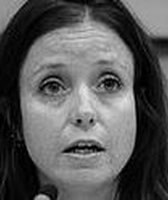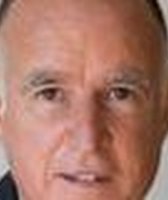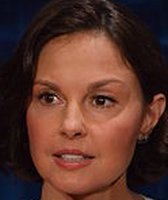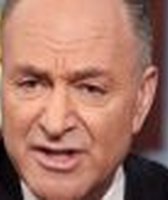Stand up for the facts!
Our only agenda is to publish the truth so you can be an informed participant in democracy.
We need your help.
I would like to contribute
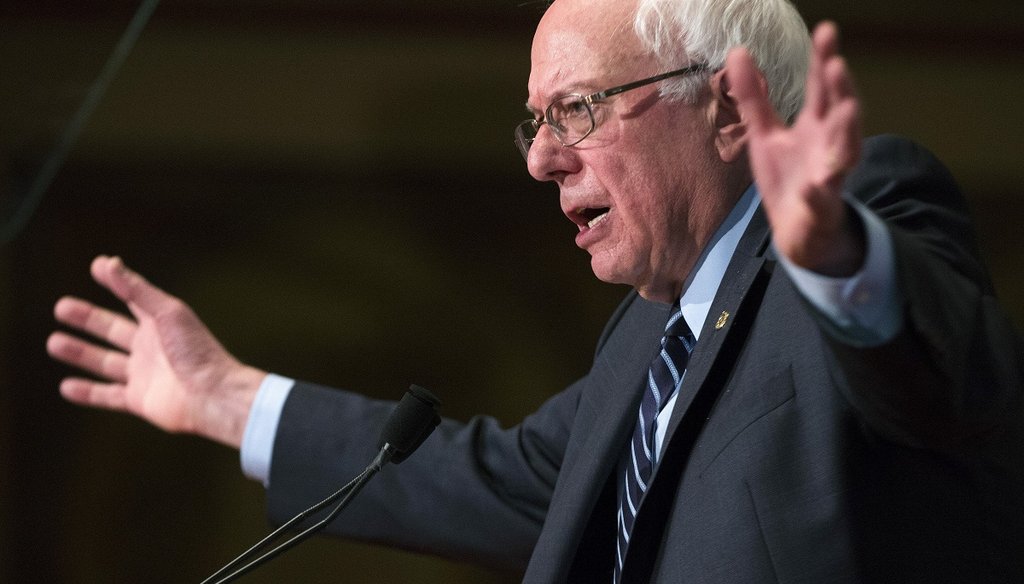
Sen. Bernie Sanders, I-Vt., speaks at Georgetown University in Washington, Nov. 19, 2015. (New York Times)
Democratic presidential candidate and Sen. Bernie Sanders brought his populist message to late-night TV on Tuesday with his first appearance on The Tonight Show Starring Jimmy Fallon.
Sanders, an outspoken independent senator from Vermont, is no stranger to the Truth-O-Meter. PolitiFact has examined 43 claims from Sanders since 2009.
Out of 43 claims, 54 percent have been rated True or Mostly True. Twenty-eight percent rated Mostly False or False.
None of his claims has been rated Pants on Fire.
Claims about a ‘rigged economy’
Many of Sanders’ statements are about the central theme of his campaign: wealth and income inequality.
He’s been talking about this for a long time. The self-described democratic socialist rose to national prominence in 2010 with an eight-hour filibuster speech, in which he said the top 1 percent in the United States earn more than 23 percent of all income.
This claim rates True. Studies show the top 1 percent earn between 21.4 and 23.5 percent of the national income in 2007, more than the entire bottom 50 percent.
Sanders has continued to stress the wealth gap since announcing his presidential candidacy, repeatedly claiming that the top 0.1 percent of Americans have almost as much wealth as the bottom 90 percent.
This claim rates Mostly True.
Economists estimate that the top 0.1 percent of the population, or about 160,000 families, own about a fifth of the nation’s wealth, the same amount as the bottom 90 percent, or 144 million families. But those figures exclude Social Security, and to do so "grossly understates the wealth held by Americans in the bottom 90 percent," said Richard Burkhauser, a professor of policy analysis at Cornell University.
Campaign finance criticisms
As a longtime supporter of campaign finance reform, Sanders has eschewed super PACs, the political fundraising organizations that can solicit unlimited amounts of money.
"Unlike virtually every other campaign, we don't have a super PAC which collects money from billionaires and corporations," he tweeted in September.
We rated his claim Mostly True.
Sanders and Donald Trump, who’s reportedly self-financing his campaign, are the only two candidates without an affiliated super PAC. But there are two pro-Sanders super PACs with no ties to Sanders or his campaign, Billionaires for Bernie and Collection Actions PAC (and one received a $50,000 donation from a confused Daniel Craig, who portrays James Bond in the 007 series).
Sanders has also criticized the race’s Democratic frontrunner, others, like Democratic rival Hillary Clinton, for their ties to big donors, as well as the big donors themselves. In October, he said that conservative billionaires David and Charles Koch are "spending more money than either the Democratic or Republican parties" in the 2016 elections.
But this line from Sanders’ stump speech rates False.
The two political parties spent about $1 billion each in the 2012 presidential cycle. The Kochs have said they will raise $750 million to $900 million from a network of contributors for the 2016 election, but only a third of that will be spent directly on campaigns.
International comparisons
Sanders thinks the United States could take a few cues from the rest of the world on health care.
One line he said said, wrongly, since 2009 is that the United States spends "twice as much per capita on health care as any other nation on Earth."
This claim rates False in 2009 and now.
The United States spends more per capita than any other country, but not twice as more as any other nation. According to the Organization for Economic Cooperation and Development’s most recent data, U.S. spending grew to $8,713 per capita in 2013. Switzerland and Norway came in second and third at $6,325 and $5,862 per capita, respectively..
Similarly, he repeats the claim that the United States "is the only major country on earth that doesn’t guarantee health care to all people."
This favorite line of Sanders’ rates Half True. While America is the only country among OECD nations that lacks universal coverage, it’s not the only one without a guaranteed right to health care. Australia, Japan and China provide public health care but haven’t formalized it as a legal right.
Race and criminal justice
Representing a state that’s 95 percent white, Sanders has struggled to reach minority voters and was notably interrupted by Black Lives Matter activists this summer. But Sanders has spoken out about the need for criminal justice reform and racial equality in policing.
On his website, Sanders writes, "African-Americans are twice as likely to be arrested and almost four times as likely to experience the use of force during encounters with the police."
We rated the statement Mostly True.
The first figure is accurate, though the second is slightly exaggerated. Blacks are three times as likely to experience force, not four times.
In 2013, blacks represented 28.3 percent of all persons arrested, even though they were only about 13.2 percent of the national population, said Marc Mauer, director of The Sentencing Project, noting that the 13.2 percent population figure is an estimate that tends to fluctuate.
"If all things were equal, you would expect blacks to represent 13.2 percent of all arrests," Mauer said. "But they are not equal. The 28 percent figure is a little more than double the national population figure."
Read all of our fact-checks on Sanders and all of the candidates in the 2016 race.
Our Sources
See individual fact-checks for sources.


